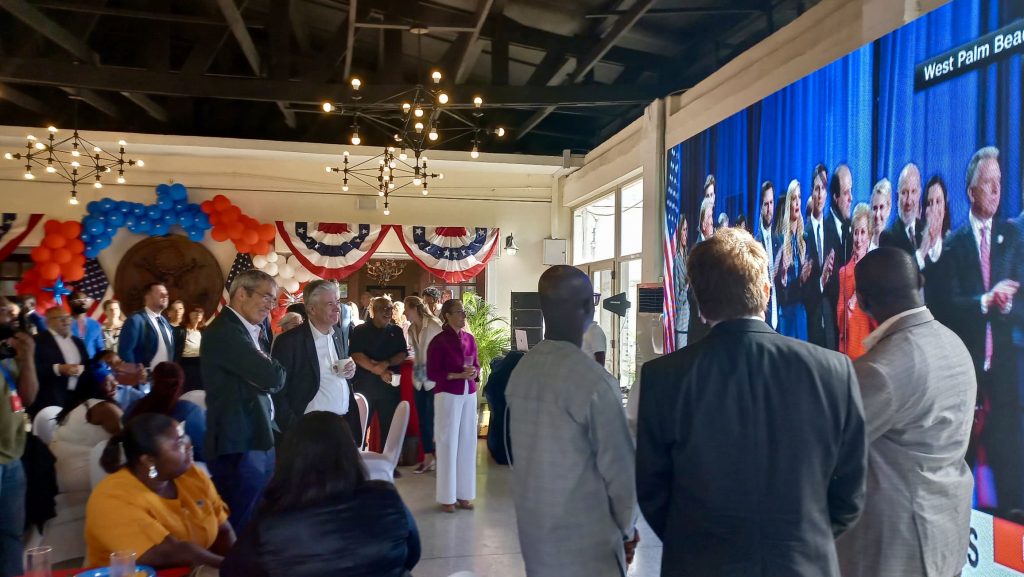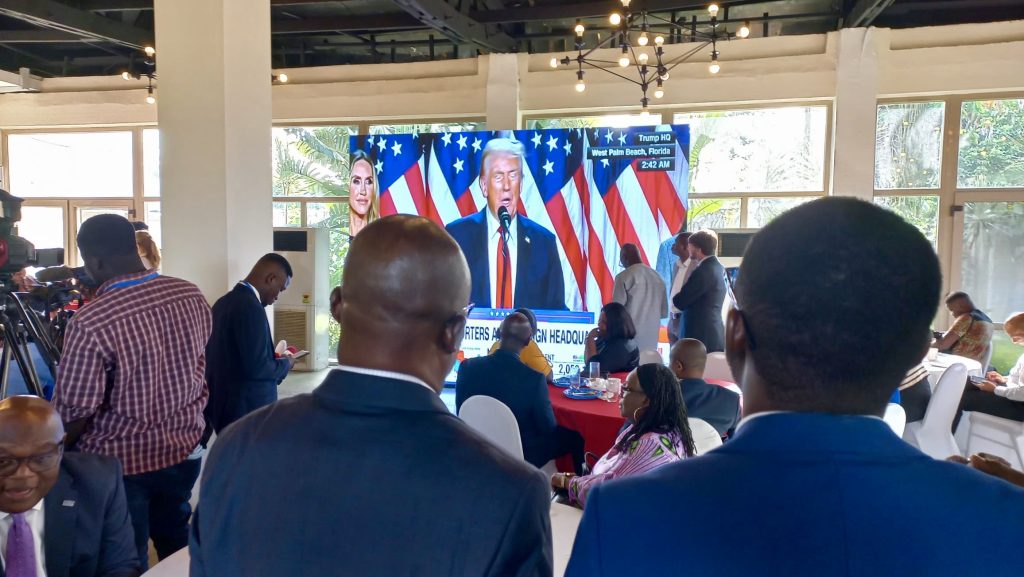By James Amoh Junior, GNA
Accra, Nov. 06, GNA – The United States (U.S.) has pledged its support to Ghana to uphold the integrity of the country’s upcoming elections.
Madam Virginia Palmer, U.S. Ambassador to Ghana, said the U.S would work closely with Ghanaian officials to ensure a transparent and credible electoral process.
Ambassador Palmer stated that the U.S. would assist “where we can make sure that the elections are run properly and reflect the will of the Ghanaian people,” underscoring the commitment to safeguard democratic principles as Ghana prepared for its crucial December 7 polls.
The Ambassador made the pledge at a breakfast and watch party for the 2024 U.S. Presidential Election at her residence in Accra.
The residence of the U.S. Ambassador became a focal point on Wednesday morning as officials from the U.S. Embassy and a select group of invited guests gathered to follow the live updates of the 2024 U.S. presidential election results.
With two large screens displaying real-time vote counts from CNN and FOX News, guests including Madam Akosua Frema-Osei Opare, Ghana’s Chief of Staff, Mr Samuel Okudzeto Ablakwa, MP for North Tongu, the Diplomatic Corps, Clergy, Journalists, among others, engaged in lively discussions and reflected on the potential impact of the election on U.S.-Ghana relations.
Amid the relaxed yet anticipatory atmosphere, tea was served as guests exchanged views on the future of American foreign policy and its implications for Ghana.
Many attendees expressed interest in understanding how the election outcome might affect ongoing U.S.-Ghana partnerships, particularly in areas of foreign aid, trade, and educational exchange programmes.
As the vote counts continued to trickle in from the U.S. with an indication of a Donald Trump possible win, participants remained engaged, discussing Ghana’s own democratic journey and the upcoming December elections.
Donald J. Trump, who was flanked by family and supporters, declared victory Wednesday morning at a campaign watch party in West Palm Beach, Florida.
“This was the greatest political movement of all time,” Mr Trump said in a wide-ranging remark over about 25 minutes.
He thanked the American people, campaign officials and his running mate, Senator JD Vance of Ohio, acknowledging that he “turned out to be a good choice.”
Ambassador Palmer, who delivered her remarks shortly after former President Donald Trump’s address, emphasised the significance of the election as a model of democracy and a potential guide for Ghana’s upcoming elections.

Ambassador Palmer stressed the importance of peaceful and well-conducted elections, citing the U.S. election as a demonstration of civic responsibility and commitment to constitutional processes, even amid intense political differences.
She encouraged Ghanaian political leaders to adopt a similar approach, noting the regional significance of Ghana’s polls.
“This election for you is historical,” she stated, and that “your example is incredibly important to your neighbours in a neighbourhood that has had democratic backsliding.”
Ambassador Palmer highlighted the United States’ ongoing support for Ghana’s democratic processes, mentioning initiatives such as Parallel Voter
Tabulation (PVT), which is designed to ensure transparency in election results and foster confidence among the public.
The PVT results, she noted, served as a reality check and can be valuable in legal contexts and explained the role it could play in both court cases and in preventing unnecessary challenges to election outcomes.
The U.S. has announced a new visa restriction policy, targeting individuals involved in activities that undermine Ghana’s democratic processes.
This move, aimed at supporting democratic governance in Ghana, was disclosed in a press statement by U.S. Secretary of State Antony Blinken, on Monday, October 28, 2024.
The visa restriction policy, set to take effect ahead of Ghana’s presidential and parliamentary elections on December 7, will be applied to specific individuals who threaten Ghana’s democratic principles.
Ambassador Palmer clarified that the policy was not aimed at any specific political party or the Government itself but was a preventive measure aimed at deterring interference.
“We are not afraid to use this tool if there are individuals or parties who act against the principles of democracy in Ghana,” she added, stressing that her hope was to avoid having to enforce this policy.
She noted that through proactive measures like early peace pact signings and responsible campaigning by political leaders, some inroads could be made.

She reflected on how Ghana’s stability and democracy could serve as an example for neighbouring countries in West Africa, some of which had faced political instability and democratic backsliding.
“We’ve had some interesting conversations with Ghanaian officials about the need for a democracy dividend, where democratic nations like Ghana show the advantages of stability and economic growth,” she observed.
Ambassador Palmer added that increased U.S.-Ghana partnerships, particularly in economic sectors, would not only benefit Ghana but also serve as a beacon for other nations in the region.
Looking ahead, Madam Palmer expressed optimism about Ghana’s capacity to conduct a credible election and maintain its standing as a democratic leader on the continent.
She further emphasised the need for ongoing civic education and the efforts of bodies like the National Peace Council in bringing stakeholders together to address potential electoral grievances before they escalate.
Ambassador Palmer reaffirmed the U.S. commitment to supporting Ghana’s democratic institutions and urged Ghanaians to view their electoral process as a cherished example for the African continent.
GNA